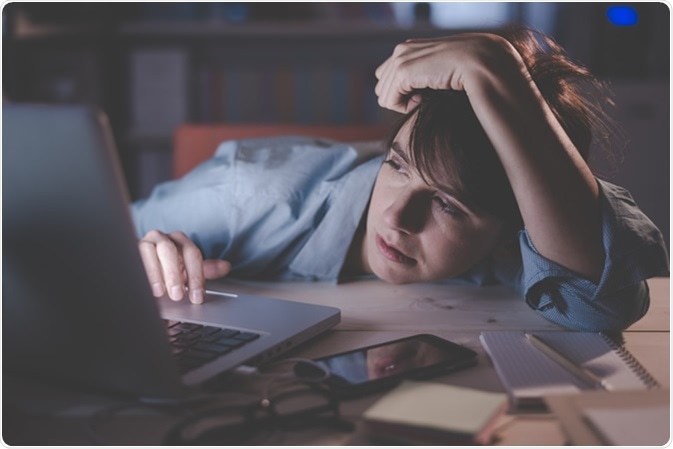Skip to:
Sleep deprivation is a condition defined as lack of sleep or disrupted sleep-wake cycle. Although it is not a specific disease, sleep deprivation can lead to poor health conditions.
What is sleep deprivation?
Sleep deprivation can result from various conditions, such as physical illness, mental illness, aging, etc. In general, an adult person should get 7 – 8 hours of sleep for a good health condition. Not getting the right amount of sleep can initiate various health problems, such as lack of concentration, drowsiness, fatigue, reduced ability to fight off infection, lack of physical strength, and reduced memory function. All these initial symptoms can eventually cause serious complications, such as insomnia, sleep apnea, narcolepsy, hallucination, mood swing, depression, and other mental illness. It can also increase the risk of heart attack, stroke, and asthma.
A sleep deprived condition can be induced by many factors. People, such as caregivers, who work longer hours than usual mostly do not get enough time for sleep, which is a potential risk factor for sleep deprivation. Similarly, people who work in shifts or are involved in jobs that demand frequent travels are at higher risk.
People with certain health conditions, such as cardiovascular problems, obesity, diabetes, stroke, depression, and attention-deficit hyperactivity disorder, are more likely to be affected by sleep deprivation. Excessive consumption of alcohol or illicit drugs also increases the risk of sleep deprivation.

Image Credit: Stokkete / Shutterstock
What causes sleep deprivation?
There are various causes of sleep deprivation, which can be voluntary behavior, personal obligations, working schedule, or medical problems. One of the important causes of chronic sleep deprivation is a conditioned emotional response. That is thinking too much about sleep problems or feeling anxious about not getting sleep on time. Such feelings can significantly impact normal sleep behaviors and prolong the period of sleep deprivation.
People sometimes undergo sleep deprivation because of voluntary choices. Instead of following a proper schedule for sleep, they prefer to read books, or watching television, or simply socialize. In contrast, certain life situations, such as having a chronically ill family member, can restrict a person’s sleeping hours.
Certain illness, such as cold or tonsillitis, can cause snoring, gagging, and wakefulness, which altogether can disrupt a normal sleeping pattern. People with sleep disorders, such as sleep apnea or snoring and periodic limb movement disorder, can face difficulty getting enough sleep. In addition, certain health problems, such as asthma, or psychiatric conditions, such as depression and anxiety, can interfere with normal sleep-wake cycle.
Certain medicines that are used to treat diseases like epilepsy or attention deficit hyperactivity disorder can disrupt normal sleep pattern at night, leading to sleep deprivation.
People who undergo sudden stressful situations in life, such as changing or losing a job, death of a close friend or family member, or moving to a new place, sometimes face acute or short-term sleep deprivation.
A variety of environmental factors, such as extreme cold or hot temperatures, loud noise, and bright light, can disrupt sleep at night. Certain lifestyle factors, such as drinking coffee or smoking cigarettes prior to bedtime, can stimulate the nervous system and delay the onset of sleep. Another vital cause of sleep deprivation is lying in the bed awake and worrying about specific conditions rather than relaxing the mind and preparing for sleep.
Parents with newborns frequently undergo sleep deprivation as they need to take care of babies. Young children and adolescents also frequently suffer from lack of sleep due to study-related commitments, such as exams and assignments.
People older than 65 years frequently undergo sleep deprivation because of aging and age-related health complications. Because of lack of physical activity during daytime time, older people sometimes face hard time falling asleep at night.
Further Reading
Last Updated: Aug 21, 2019